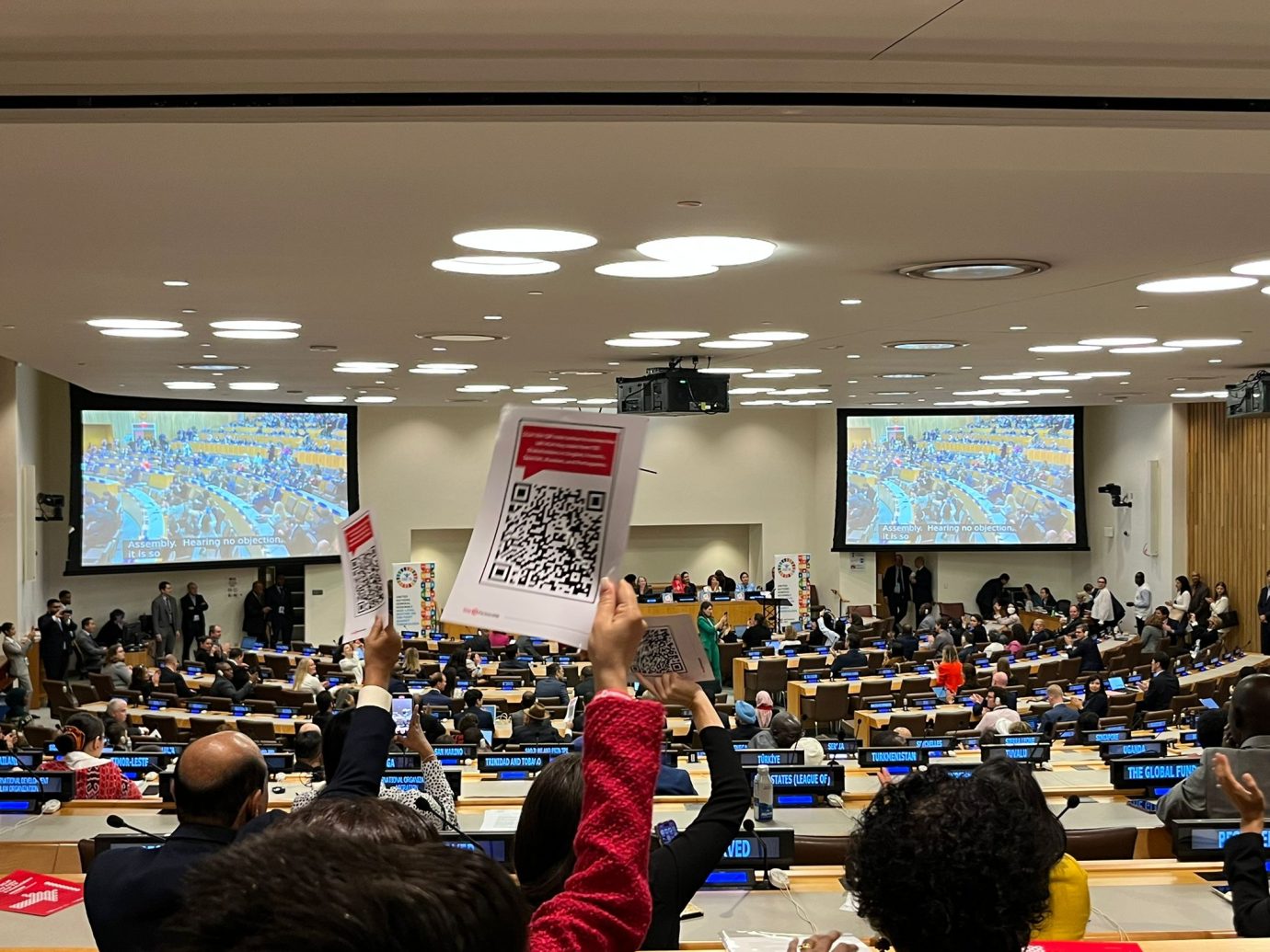KNCV Tuberculosis Foundation welcomes the Political Declaration, formally adopted by United Nations Member States, of the High-Level Meeting (HLM) on the Fight Against Tuberculosis in New York at the 78th United Nations General Assembly (UNGA). The livestream of the meeting is available to watch here.
KNCV also attended the UN HLM on TB this year. We are especially inspired by the words of Ernst Kuipers, Dutch Minister of Health, Welfare and Sports. He said, “the Netherlands is committed to end TB in cooperation with other countries, Civil Society organizations, scientific institutions, healthcare workers and communities”. KNCV not only shares this commitment but challenges others to commit as well.
You can view his speech via the video below.
We are excited to share some noteworthy outcomes from the meeting, demonstrating a renewed global commitment to end TB! Some of our key takeaways from the meeting include:
- Global leaders are all recommitting to ending TB by 2030
- All acknowledged the need for additional funding, especially in Research & Development (R&D)
- Significant announcements by USAID on:
- Cost reduction on GeneXpert cartridges by 30%
- Additional investment in TB preventative treatment (TPT) for over 2.5 million dose
- The Dutch Ministry of Health investments emphasize R&D and health system resilience the need to coordination among the 3 UNHLM outcomes: universal health coverage (UHC), pandemic prevention, preparedness & response (PPPR) and TB.
- Innovation of new tools and TB-vaccines were discussed in many side events, the key point was addressing access among high burden countries.
The Declaration contains the most ambitious targets to date in the fight against TB. If countries follow through on their commitments, it will put the world on track to ending TB by 2030 and providing life-saving treatment for 45 million people between 2023 and 2027.
Among key highlights, member states committed to providing life-saving treatment for up to 45 million people between 2023 and 2027, including up to 4.5 million children and up to 1.5 million people with drug-resistant tuberculosis; and to provide up to 45 million people with preventive treatment, including 30 million household contacts of people with tuberculosis, including children and 15 million people living with HIV.
Member states also committed to increasing annual global TB funding levels to over four times the current level ($5.4 billion) towards reaching $22 billion annually by 2027, increasing to $35 billion by 2030. They agreed to mobilize this funding through domestic and international investment mechanisms, innovative financing mechanisms, and costed action plans.
Member states also committed to mobilize $5 billion a year by 2027 for tuberculosis research and innovation – a five times increase from the current $1 billion a year – towards the development of point of care diagnostics, vaccines for all forms of tuberculosis, and shorter, safer and more effective treatment regimens.
“This Declaration contains clear targets for the fight against TB. The TB community should be proud of their amazing work done to secure these targets. However, we know commitments alone aren’t enough and Declarations will gather dust without further action. In 2018 member states promised to provide $13 billion a year in annual TB funding by 2022, yet they’re providing less than half that amount – who is accountable for the failure to follow through on this promise?”, said Lucica Ditiu, Executive Director of the Stop TB Partnership. “This is why we need strong accountability efforts and tools to hold leaders and all of us accountable to reaching their promises. This starts with translating the global targets and commitments to national level, which Stop TB Partnership is currently working on, and ensuring civil society and TB communities have the resources and tools to ensure leaders follow through on their commitments.”
Member states also made critical commitments to prioritize TB affected communities through agreement to create enabling legal and policy frameworks to combat inequality and eliminate TB-related discrimination, stigma and other human rights barriers, to ensure that the TB response is equitable, inclusive, people-centered and promotes gender equality and respects human rights including with regard to policymaking forums, planning, and comprehensive tuberculosis care delivery, and to increase and sustain investment for initiatives at the community level.
Unfortunately, member states failed to attach deadlines to these commitments which had been prioritized by TB-affected communities in their ‘Deadly Divide‘ Accountability Report, and again featured in the interventions during the HLM itself. A small group of member states also opposed critical references to community-led monitoring and community, rights and gender action plans, which resulted in their removal during the negotiations process.
Member states failed to agree to several other key measures requested in the TB Community’s Key Asks document, including a strong, robust, system of accountability in the Political Declaration to ensure regular and timely monitoring and follow-up, as well as weakened language on having a safe and effective new TB vaccine available in the next five years.
We would like to convey our congratulations to the High-Level Meeting co-facilitators, H.E. Mr. Krzysztof Szczerski, Permanent Representative of the Republic of Poland to the United Nations, and H.E. Mr. Bakhtiyor Ibragimov, former Permanent Representative of Uzbekistan to the United Nations, their teams, as well as the President of the 77th Session of the UN General Assembly, H.E. Csaba Korosi, and recognize their leadership and commitment towards this important step towards the adoption of the Declaration in the UN General Assembly in the coming weeks.

